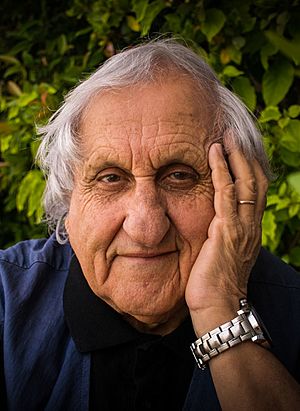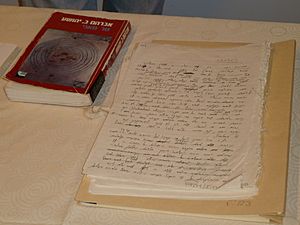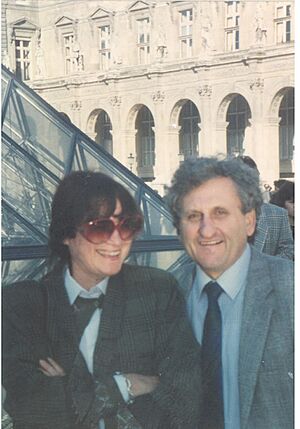A. B. Yehoshua facts for kids
Quick facts for kids
A. B. Yehoshua
|
|
|---|---|

Yehoshua in 2017
|
|
| Born | Avraham Gabriel Yehoshua December 9, 1936 Jerusalem, Mandatory Palestine |
| Died | June 14, 2022 (aged 85) Tel Aviv, Israel |
| Occupation |
|
| Nationality | Israeli |
| Alma mater | Hebrew University of Jerusalem (BA, 1961) Teachers College (1962) Sorbonne (MA, French Literature) |
| Literary movement | Israeli "New Wave" |
| Notable works | Mr. Mani (1990); The Lover (1977); "Facing the Forest" |
| Notable awards | ACUM Prize 1961 National Jewish Book Award 1990, 1993 Israel Prize for Literature 1995 Los Angeles Times Book Prize 2006 A Woman in Jerusalem |
| Spouse |
Rivka Kirsninski
(m. 1960; |
Avraham Gabriel Yehoshua (Hebrew: אברהם גבריאל (בולי) יהושע; born December 9, 1936 – died June 14, 2022) was a famous Israeli writer. He wrote novels, essays, and plays. The New York Times once called him the "Israeli Faulkner" because of his writing style.
Yehoshua's stories often explored important ideas. He wrote about what it means to be Jewish. He also wrote about how Jewish people relate to non-Jewish people. His books looked at the differences between older and younger generations. He also explored the connections between religion and politics.
Contents
About A. B. Yehoshua's Life
Avraham Gabriel Yehoshua, also known as "Boolie," was born in Jerusalem. His family had lived in Jerusalem for many generations. They were Sephardi Jews, originally from Salonika, Greece.
His father, Yaakov Yehoshua, was a scholar and writer. He studied the history of Jerusalem. His mother, Malka Rosilio, was born in Morocco. She moved to Jerusalem with her family in 1932. Avraham grew up in the Kerem Avraham neighborhood of Jerusalem.
He went to Gymnasia Rehavia high school in Jerusalem. As a young person, Yehoshua was part of the Hebrew Scouts Movement in Israel. After school, he joined the Israeli army. He was a paratrooper from 1954 to 1957. He also took part in the 1956 Sinai War.
After his army service, Yehoshua studied literature and philosophy. He went to the Hebrew University of Jerusalem. Later, he became a teacher. He lived in the Neve Sha'anan neighborhood of Jerusalem.
From 1963 to 1967, Yehoshua lived in Paris, France. He taught there and was the General Secretary of the World Union of Jewish Students. In 1972, he started teaching at the University of Haifa. He became a Full Professor there. He was also a visiting professor at other famous universities. These included Harvard, the University of Chicago, and Princeton.
Yehoshua was married to Rivka, a clinical psychologist. She passed away in 2016. Yehoshua died on June 14, 2022, in Tel Aviv Sourasky Medical Center. He was 85 years old.
His Writing Career
Yehoshua started writing fiction after his time in the army. His first book of stories, Mot Hazaken (The Death of the Old Man), came out in 1962. He became a leading writer in a group called the "new wave" of Israeli writers. These writers focused more on individual people and their feelings. This was different from earlier writers who focused on groups.
Yehoshua said that Franz Kafka, Shmuel Yosef Agnon, and William Faulkner influenced his writing. He wrote twelve novels, three short story collections, four plays, and four essay collections. One of his essay collections is Ahizat Moledet (Homeland Lesson, 2008). It shares his thoughts on identity and literature.
One of his most famous novels is Mr. Mani. This book looks at Jewish identity over 200 years. It tells the story through five conversations that go backward in time. The story covers Jewish life in Jerusalem and around the Mediterranean Basin. Mr. Mani was even made into a five-part TV series.
Many of Yehoshua's works explore family relationships. For example, his novel Friendly Fire looks at how families can struggle. His books have been translated into 28 languages. Many of them have also been made into movies, TV shows, plays, and even operas.
His Views and Ideas
Yehoshua was active in the Israeli Peace Movement. He shared his political ideas in essays and interviews. He supported efforts for peace, like the Geneva Accord. He often spoke about his concerns regarding the Israeli occupation. He also commented on Palestinian political culture.
Before the 2008–2009 Israel-Gaza conflict, he asked people in Gaza to stop the violence. He explained why Israel's actions were needed but also why they should end quickly. He said, "We will always be neighbors, so the less blood is shed, the better the future will be." He hoped that border crossings could open fully. He also wanted Palestinians to work in Israel as part of a peace agreement.
Awards and Recognition

A. B. Yehoshua received many important awards for his writing:
- In 1972, he won the Prime Minister's Prize for Hebrew Literary Works.
- He was awarded the Brenner Prize in 1983.
- In 1986, he received the Alterman Prize.
- He shared the Bialik Prize for literature in 1989.
- In 1995, he received the highest honor in Israel, the Israel Prize for Hebrew literature.
- He also won the National Jewish Book Award and the Koret Jewish Book Award in the U.S.
- In the United Kingdom, he won the Jewish Quarterly-Wingate Literary Prize.
- In 2005, he was considered for the first Man Booker International Prize.
- His book "A Woman in Jerusalem" won the Los Angeles Times Book Prize in 2006.
- In Italy, he received several awards, including the Grinzane Cavour Award and the Viareggio Prize for Lifetime Achievement.
- Many universities gave him honorary doctorates. These included Hebrew Union College and Tel Aviv University.
- In 2012, he won the Prix Médicis étranger for his novel The Retrospective.
- He received the Dan David Prize Award in 2017.
Works in English Translation
Novels
- The Lover (1978)
- A Late Divorce (1984)
- Five Seasons (1989)
- Mr. Mani (1992)
- Open Heart (1995)
- A Journey to the End of the Millennium (1999)
- The Liberated Bride (2003)
- A Woman in Jerusalem (2006)
- Friendly Fire: A Duet (2008)
- The Retrospective (2013)
- The Extra (2014)
- The Tunnel (2020)
Short Stories
- Early in the Summer of 1970 (1977)
- Three Days and a Child (1970)
- The Continuing Silence of a Poet (1988)
Essays
- Israel (1988)
- Between Right and Right (1981)
- The Terrible Power of a Minor Guilt (2000)
- "An Attempt to Identify the Root Cause of Antisemitism" (2008)
Plays
- A Night in May (1974)
- Possessions (1993)
- Journey to the End of the Millennium (opera libretto, 2005)
- A Tale of Two Zionists (2012)
See also
 In Spanish: Abraham B. Yehoshúa para niños
In Spanish: Abraham B. Yehoshúa para niños
- List of Israel Prize recipients
- List of Bialik Prize recipients
 | Toni Morrison |
 | Barack Obama |
 | Martin Luther King Jr. |
 | Ralph Bunche |


